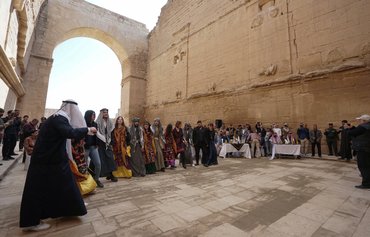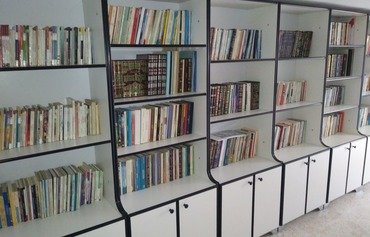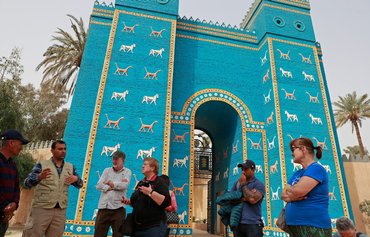MOSUL -- The storied library of Iraq's Mosul University boasted a million titles before "Islamic State of Iraq and Syria" (ISIS) elements rampaged through it, toppling bookshelves and burning ancient texts.
During the two-and-a-half years that ISIS occupied the university campus, its fighters set fire to the main library and transformed buildings where students had once studied into warehouses for weapons and ammunition.
After Iraqi and international coalition forces regained control of the campus, they discovered ISIS had been manufacturing rudimentary chemical weapons there.
Now, almost five years after the group's defeat, Mosul is trying to rebuild the pride of the city long known as a literature hub boasting countless booksellers and archives guarding rare manuscripts.
![A man on January 31 picks a book from the collection of Mosul central library, founded in 1921. [Zaid al-Obeidi/AFP]](/cnmi_am/images/2022/02/16/33955-Librarian-Mosul-bookshelf-600_384.jpg)
A man on January 31 picks a book from the collection of Mosul central library, founded in 1921. [Zaid al-Obeidi/AFP]
![An Iraqi youth sits at a stall for books and school supplies in Iraq's northern city of Mosul on January 31. [Zaid al-Obeidi/AFP]](/cnmi_am/images/2022/02/16/33959-Iraqi-bookseller-Mosul-600_384.jpg)
An Iraqi youth sits at a stall for books and school supplies in Iraq's northern city of Mosul on January 31. [Zaid al-Obeidi/AFP]
Mohamed Younes, technical director of the prestigious university library, recalls the carnage he witnessed after Mosul was recaptured from ISIS in mid-2017 following long and gruelling street battles.
"When we came back, we saw... the books pulled from the shelves, thrown on the ground and burned," he said.
Thousands of texts on philosophy, law, science and poetry which in some way contradicted ISIS's extremist ideology had gone up in flames.
A full 85% of the collection was lost, with some of the most valuable titles sold on the black market.
"Before, we had more than a million titles, some of which couldn't be found in any other university in Iraq," Younes said.
Before ISIS, Mosul University was "the mother of all books", said former student Tarek Attiya, 34, who is now enrolled at Tikrit university. "There is a huge difference between what used to be and the situation after ISIS."
Citywide revival
As part of a citywide revival, Mosul museum and its 2,500-year-old treasures, some of which were smashed into pieces by ISIS elements, are gaining a second life thanks to restoration efforts backed by French specialists.
ISIS had filmed its elements taking hammers to pre-Islamic treasures they deemed heretical, proudly advertising their rampage in a 2015 video.
The largest and heaviest artefacts were destroyed for the sake of their propaganda, but -- as with the library -- others were sold on the black market.
France's Louvre museum is supporting restoration efforts, as are the International Alliance for the Protection of Cultural Heritage in Conflict Areas, Washington's Smithsonian Institution and the New York-based World Monuments Fund.
The city's religious heritage also has been the focus of reconstruction efforts.
Mosul's 12th-century al-Nuri mosque, known for its leaning al-Hadba minaret, is being rebuilt as part of a United Nations cultural agency (UNESCO) project.
And in September, a new bell -- cast in Lebanon with donations from Fraternity in Iraq, a French NGO that helps religious minorities -- was installed at the Syriac Christian church of Mar Tuma.
ISIS had used the church of Mar Tuma, which dates back to the 19th century, as a prison or a court.
Now there is a revival going on to line the library shelves with books again.
The library building, refurbished with UN financing, is set to reopen this month. Four floors high with a sleek glass exterior, it will have an initial 32,000 books, as well as a trove of e-books.
For now, the books are being housed in the university's engineering faculty, where shelves are overflowing and titles are stacked on every available surface.
Significant donations from Arab and international universities have enabled the revival of the library, the director said, along with donations from private collectors from across Iraq.
Appetite for reading
Signs of Mosul's fledgling cultural revival have begun to take root, though some of the lost cultural heritage will be irreplaceable.
The library of the Waqf, the state body that manages Islamic endowments, once contained manuscripts dating back 400 years, said its director, Ahmed Abd Ahmed.
But, he added sadly, "they have all disappeared".
Elsewhere in the city, Al-Nujaifi street, historically lined with booksellers, still bears the scars of destruction wrought by the extremists.
Many shops are abandoned, and there are mounds of rubble under the street's old stone arches, though a handful of shopkeepers have reopened their doors.
Mosul's century-old central public library, which had boasted more than 120,000 titles, reopened its doors in late 2019, after restoration.
"We lost 2,350 books on literature, sociology or religion," said its director Jamal al-Abd Rabbo.
But public donations and purchases have seen the collection grow, he said, and there are now up to 132,000 titles on the library's shelves.
Crucially, the public's appetite for literature remains unbroken, he said, and "some of our visitors come daily, for an hour or two, to read".

![A librarian shows a book from the collection of Mosul central library on January 31. [Zaid al-Obeidi/AFP]](/cnmi_am/images/2022/02/16/33954-Mosul-library-book-600_384.jpg)






